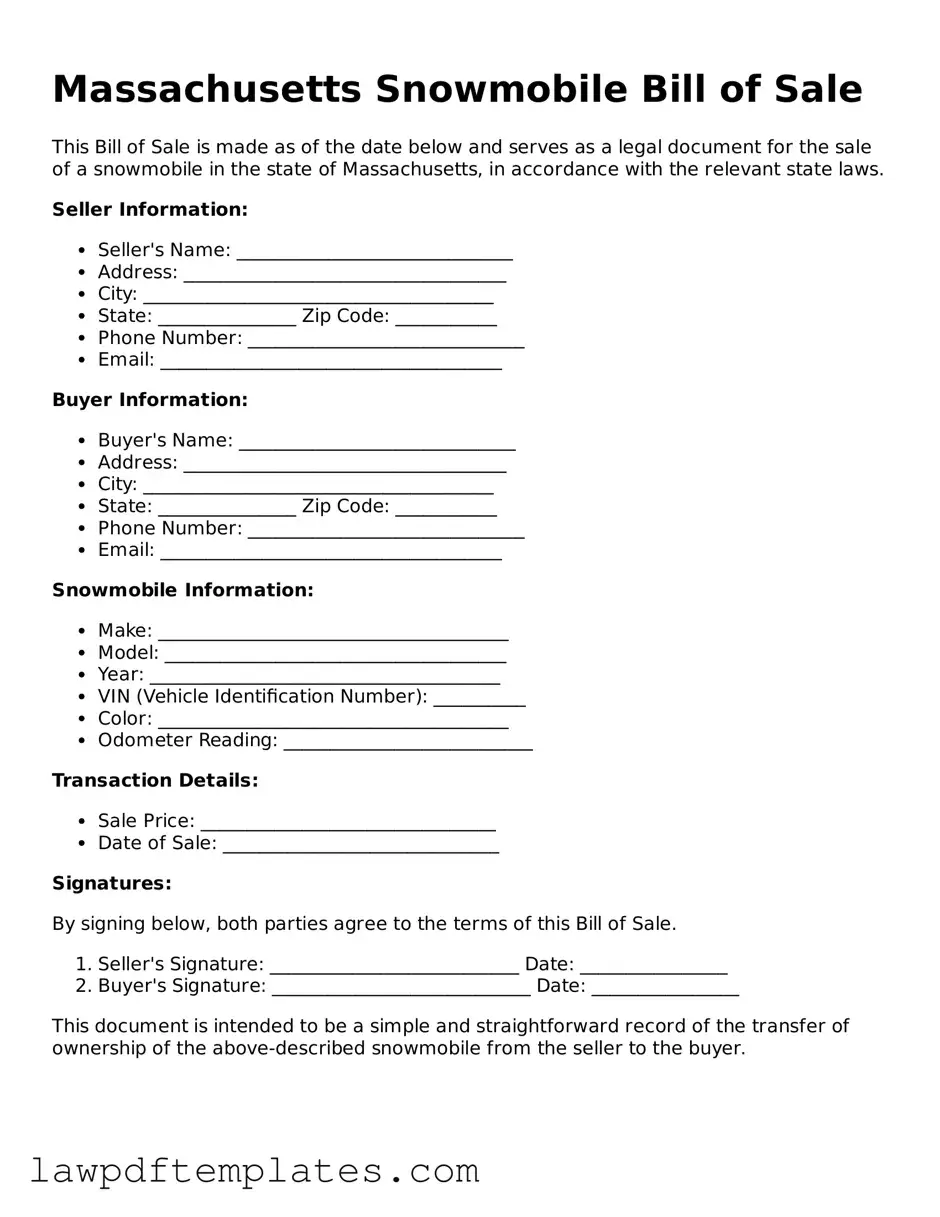Free Snowmobile Bill of Sale Template for the State of Massachusetts
Form Breakdown
| Fact Name | Details |
|---|---|
| Purpose | The Massachusetts Snowmobile Bill of Sale form is used to document the sale or transfer of ownership of a snowmobile between parties. |
| Governing Laws | This form is governed by Massachusetts General Laws, Chapter 90B, which regulates the use and registration of recreational vehicles, including snowmobiles. |
| Required Information | Both the seller and buyer must provide their names, addresses, and signatures, along with details about the snowmobile, such as the make, model, and Vehicle Identification Number (VIN). |
| Registration Implications | Completing this form is essential for the buyer to register the snowmobile with the Massachusetts Registry of Motor Vehicles. |
Sample - Massachusetts Snowmobile Bill of Sale Form
Massachusetts Snowmobile Bill of Sale
This Bill of Sale is made as of the date below and serves as a legal document for the sale of a snowmobile in the state of Massachusetts, in accordance with the relevant state laws.
Seller Information:
- Seller's Name: ______________________________
- Address: ___________________________________
- City: ______________________________________
- State: _______________ Zip Code: ___________
- Phone Number: ______________________________
- Email: _____________________________________
Buyer Information:
- Buyer's Name: ______________________________
- Address: ___________________________________
- City: ______________________________________
- State: _______________ Zip Code: ___________
- Phone Number: ______________________________
- Email: _____________________________________
Snowmobile Information:
- Make: ______________________________________
- Model: _____________________________________
- Year: ______________________________________
- VIN (Vehicle Identification Number): __________
- Color: ______________________________________
- Odometer Reading: ___________________________
Transaction Details:
- Sale Price: ________________________________
- Date of Sale: ______________________________
Signatures:
By signing below, both parties agree to the terms of this Bill of Sale.
- Seller's Signature: ___________________________ Date: ________________
- Buyer's Signature: ____________________________ Date: ________________
This document is intended to be a simple and straightforward record of the transfer of ownership of the above-described snowmobile from the seller to the buyer.
Common mistakes
When filling out the Massachusetts Snowmobile Bill of Sale form, many individuals overlook crucial details that can lead to complications down the line. One common mistake is failing to include the full names of both the buyer and the seller. This might seem minor, but without accurate identification, ownership issues can arise.
Another frequent error is neglecting to provide the correct vehicle identification number (VIN). The VIN is essential for identifying the specific snowmobile being sold. If this number is incorrect or missing, it can create confusion and may even invalidate the sale.
Many people also forget to document the sale price clearly. This figure is not just a formality; it can impact future registration and tax obligations. A vague or incomplete price can lead to disputes or misunderstandings later on.
Additionally, failing to include the date of sale is a mistake that can complicate matters. This date is crucial for establishing when the transfer of ownership occurred. Without it, tracking ownership history becomes difficult, which can be problematic for both parties.
Some sellers mistakenly believe that their signature alone suffices. However, both the buyer and seller must sign the form. Omitting one signature can render the document ineffective, leaving the transaction in limbo.
Another pitfall is not retaining a copy of the completed form. After the sale, both parties should have a record of the transaction. Without a copy, proving ownership or the terms of the sale may become challenging if disputes arise.
People often overlook the importance of checking for errors before submitting the form. Simple typos or inaccuracies can lead to delays in registration or even legal complications. A careful review can save time and hassle later.
In some cases, individuals fail to understand the implications of not disclosing any liens on the snowmobile. If there is a lien, it must be addressed in the bill of sale. Not doing so can leave the buyer with unexpected financial obligations.
Another mistake is not verifying the identity of the buyer or seller. Ensuring that both parties are who they claim to be can prevent fraud and protect the interests of everyone involved.
Lastly, many individuals do not seek assistance or clarification when unsure about any part of the form. Whether it’s a question about a specific section or the process itself, asking for help can prevent costly mistakes and ensure a smooth transaction.
Discover More Snowmobile Bill of Sale Templates for Specific States
Bill of Sale Michigan Vehicle - Facilitates a smooth exchange during the sale process.
For those needing to complete the verification process swiftly, the Texas Employment Verification form can be conveniently accessed online, allowing employers to fill out the required details efficiently via texasformspdf.com/fillable-texas-employment-verification-online/, ensuring compliance with state regulations and facilitating quicker state benefit applications.
